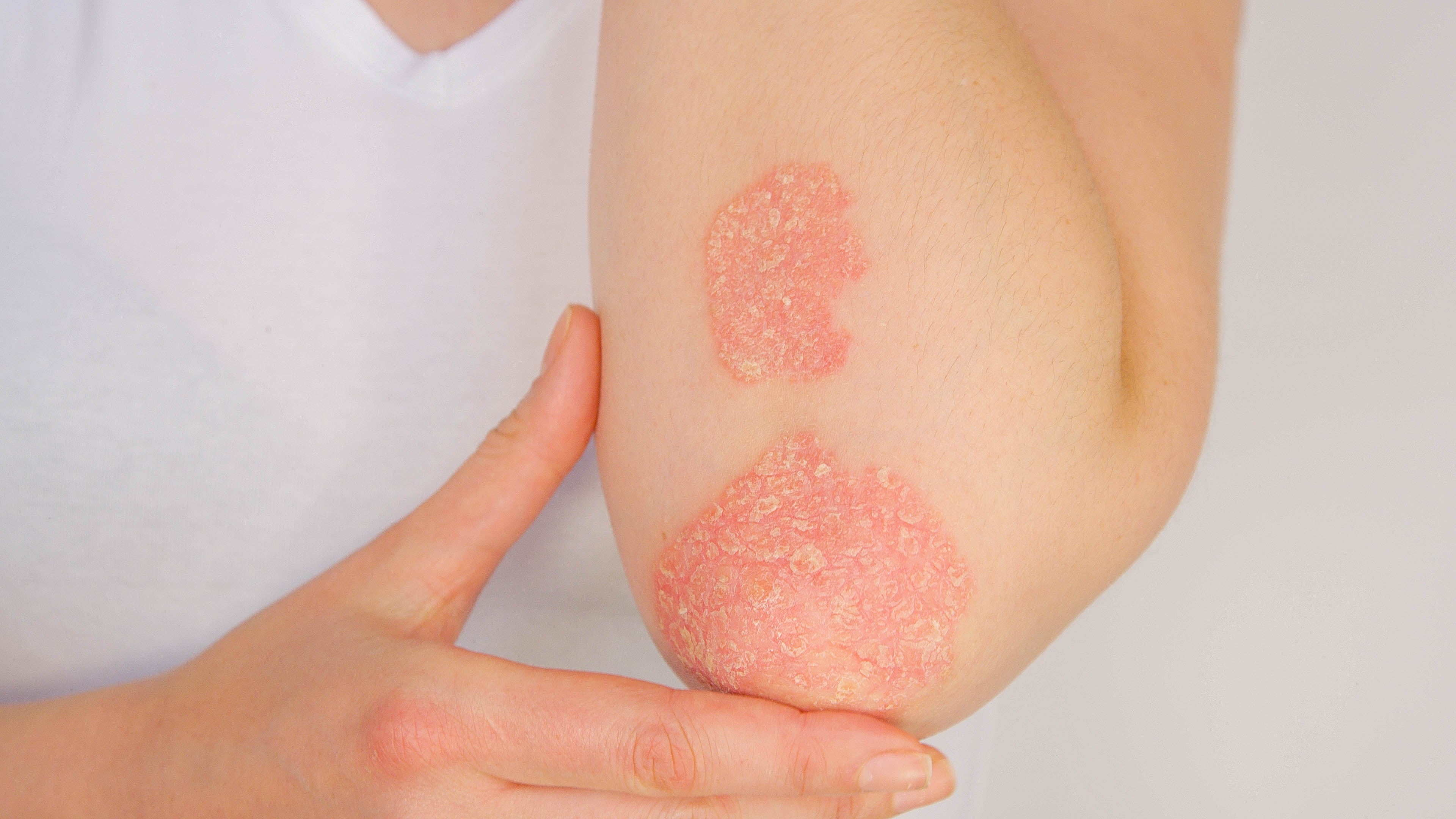Understanding Psoriasis
Psoriasis is a chronic, autoimmune disease that causes the skin to develop scales and become red, and inflamed. Scaling occurs when cells in the outer layer of skin reproduce faster than normal and pile up on the skin’s surface. This is caused by cells of the immune system which inappropriately produce hormone-like signals that speed up the growth cycle of skin cells. Psoriasis is not contagious. There are five types of psoriasis: plaque, guttate, inverse, pustular and erythrodermic. The most common form, plaque psoriasis, appears as raised, red patches or lesions covered with a silvery white buildup of dead skin cells, called scale. Psoriasis can occur on any part of the body.
Psoriasis affects more than 7 million people in the U.S. It occurs in all age groups and about equally in men and women. People with psoriasis may suffer discomfort, restricted motion of joints, and emotional distress.
When psoriasis develops, patches of skin thicken, redden, and become covered with silvery scales. These patches are sometimes referred to as plaques. The areas of involvement frequently itch or burn, and the skin may crack. Psoriasis most often occurs on the elbows, knees, scalp, lower back, face, palms, and soles of the feet. The disease also may affect the fingernails, toenails, and the soft tissues inside the mouth and genitalia. About 10% of people with psoriasis have joint inflammation that produces symptoms of arthritis. This condition is called psoriatic arthritis.
What causes psoriasis?
Research indicates that psoriasis may be a disorder of the immune system. The immune system includes a type of white blood cell, called a T cell that normally helps protect the body against infection and disease. Scientists now think that psoriasis is related to an abnormal immune system that deposits too many T cells in the skin. These T cells trigger the inflammation and excessive skin cell reproduction. The rapidly dividing skin cells push their way to the surface of the skin where they form plaques.
In some cases, psoriasis is inherited. Researchers are studying large families affected by psoriasis to identify a gene or genes associated with the disease. (Genes govern every body function and determine inherited traits that are passed from parent to child.)
Are there treatments for Psoriasis?
There are many topical OTC and prescription drugs available for treating the symptoms of psoriasis, but there is no cure for the disease. Of the products available to treat psoriasis, none of the OTC drugs, which contain such FDA approved “drugs” as coal tar or salicylic acid, have been shown to be particularly effective in relieving the itching or reducing the number or severity of plaques. Prescription topical drugs include corticosteroids (clobetasol, betamethasone), vitamin D analogues (e.g. Dovonex), or topical vitamin A derivatives (Tazorec). All are somewhat effective short term, and all have some negative side effects. Oral medications include cyclosporine and methotrexate. Phototherapy is also used to treat mild psoriasis. More recent drugs developed for treating moderate to severe psoriasis include “biologics” which specifically target components of the immune system known to be involved in psorsiasis. These include monoclonal antibodies to block T-cell receptor activation (Amevive) and antibodies that block TNF-alpha, an inflammatory cytokine of the immune system (Enbrel). Although these new “biologic” injectables are effective, they are expensive, and because they are strongly immunosuppressive, they can markedly increase the risk of infection.
As mentioned above, there are many OTC topical products available to treat psoriasis, but up to now none have been particularly effective. Because of the long history and safety of Salicylic Acid as a psoriasis treatment, scientists at the University of Oklahoma Health Sciences Center decided to investigate the use of newer formulation technologies to incorporate salicylic acid into an effective psoriasis treatment product. The result was the development of a novel, proprietary cosmetic silicone based serum that contained 2% salicylic acid, which was both moisturizing and gentle to the skin. Moreover, the formulaton was designed to be more efficient than creams, lotions or ointments in delivering salicylic acid when applied topically. The formulation that was developed glides on the skin and unlike typical emulsifier-based lotions, which can irritate the skin, this silicone based product does not damage the skin’s surface or cause any discomfort.
To investigate the efficacy of this silicone based serum on psoriasis, a small clinical study study was carried out. The investigator for this clinical investigation was Dr. Zoe Draelos, a highly respected and world-recognized dermatologist. For the study, 20 patients with mild to moderate psoriasis were evaluated for psoriasis using an ordinal 6 point scale. Evaluations were conducted at the start of the study (baseline), at 2 weeks, and at 4 weeks. The results at 4 weeks are shown in the bar graph below. The statistical evaluation of the data was performed using a two-tailed Mann-Whitney test.

After 2 weeks of serum use, the clinical investigator’s evaluation showed a statistically significant improvement in erythema (p= 0.016) and scaling (p=0.018) which led to a statistically significant decrease in overall severity (p=0.022). This improvement continued on into week 4 where the investigator found statistically significant improvements in erythema (p=0.008), scaling (p=0.008), excoriation (p=0.021), induration (p=0.023) and overall improvement (p=0.002). This high degree of statistical significance in such a small population of patients indicates that the topical serum formulation is highly effective in reducing the severity of psoriasis.
The patient evaluation of the serum product was essentially the same as the investigator’s assessment. Patient evaluations showed statistically significant improvements in redness (p=0.017), peeling (p=0.007), roughness (p=0.004), itching (p=0.054) and overall severity (p=0.008) in just 4 weeks of use.
In summary, this silicone-based formulation was shown to reduce the PASI score (an index for psoriasis severity by almost 50% with just 3 weeks of use.
This OTC drug product is sold under the brand name, PsoriaSolv. It is currently in the manufacturing process and should be available for purchase by November 2022.






